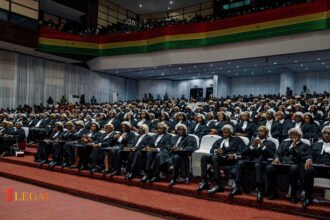
Published February 10, 2025
On Friday 27th December 2024, the Supreme Court of Ghana delivered a significant ruling on the 2024 parliamentary elections recount, which has far-reaching implications for the electoral process. The ruling has been hailed as a major victory for the applicants, (the National Democratic Congress, NDC), who had challenged an Accra High Court’s decision to grant orders of mandamus against the Electoral Commission (EC) to undertake collation of polling station results in six constituencies.
The Applicants inter alia claimed they had already been declared winners in four constituencies, while the Interested Parties argued that collations were disrupted, and the EC had stopped the processes without explanation.
The Supreme Court upon hearing the parties quashed the High Court’s orders regarding the four constituencies, stating that the trial judge violated the Applicants’ constitutional right to a fair hearing by not allowing them to present their case.
Four major highlights worthy of note from the decision of the Supreme Court are as follows:
1. THE RIGHT TO BE HEARD; A FUNDAMENTAL HUMAN RIGHT:
The Supreme Court held that the right to be heard is a fundamental right (see Article 19 of the 1992 Constitution of Ghana). Also, the Supreme Court cited the audi alteram partem rule, which is a sacrosanct rule in common law jurisdictions, and held that the applicants were entitled to be heard, regardless of the rules of court on joinder. The upshot being that judge erred in failing to grant the applicants a hearing and consequently rendered the decision of the court a nullity.
2. BIAS AND IMPARTIALITY ON THE PART OF THE JUDGE:
While the Applicants alleged bias from the trial judge for prioritizing the Interested Parties’ applications, the Supreme Court found insufficient evidence to support claims of bias but directed those future hearings be assigned to a different judge to maintain judicial integrity. This is mainly because, as held in the case of Attorney General v Sallah, there must be evidence of “real likelihood of bias” as a threshold in order for such an action to succeed. It would appear that that threshold of real likelihood of bias was not satisfied by the Applicants in this suit.
3. GRANT OF CERTIORARI:
Relying on Article 132 of the 1992 Constitution of Ghana and the case of Awuni v. West African Examinations Council, the Supreme Court gave relief to the applicants: quashing the High Court’s orders of mandamus made in respect of four constituencies (Okaikwei Central, Ablekuma North, Tema Central, and Techiman South)
FURTHER DIRECTIONS BY THE SUPREME COURT
The court held that the trial judge had a discretion to join the applicants to the case, and that he failed to exercise that discretion fairly. The court emphasized that the trial Judge’s decision was not conclusive and that the applicants’ remedy was to appeal against the exercise of discretion as of right. The Supreme Court therefore allowed the Applicants to join the mandamus applications and directed expedited hearings to ensure timely resolution, reflecting the urgency given the electoral and constitutional calendar.
The Supreme Court’s ruling in this case is a significant development on electoral governance in Ghana. Clearly, the Court’s decision to quash the orders of mandamus made in respect of the four constituencies has emphasized and affirmed some of the well-known cherished principles in our jurisprudence.
Firstly, the Court’s emphasis on the importance of the right to be heard in the administration of justice is crucial. The audi alteram partem rule, which requires that a person be given a hearing before a decision affecting them is made, is a fundamental principle of justice that must be respected by the courts.
Secondly, the case highlights the need for courts to ensure that parties are given a fair opportunity to present their case, and that the right to be heard is not denied or compromised. The Supreme Court’s ruling is a reminder that the administration of justice must be fair, impartial, and transparent.
Finally, in the given circumstances of the application, it is commendable for the court to have acted/moved swiftly to bring a resolution to the matters by delivering a ruling in the process enforcing and reiterating the court’s pre-eminent role in the administration of justice.
Wisdom Kojo Sorkpor Jnr contributed to this article











